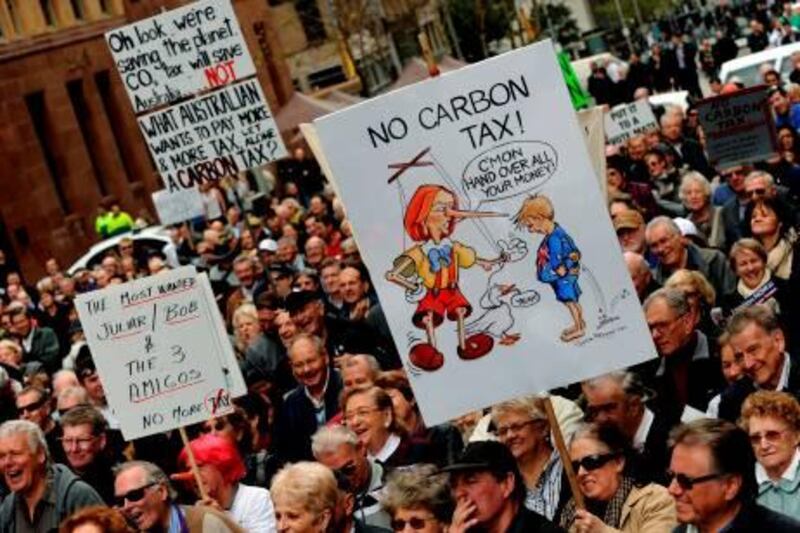CANBERRA // Prime minister Julia Gillard will visit every Australian state and regional capital in the next two weeks, and will run ads on popular television shows as part of a campaign to reverse public opposition to her carbon plan.
The government plans to cut taxes for workers as Ms Gillard tries to woo a public deterred by rising costs associated with a climate-change plan opposed by 60 per cent of Australians. Presenting the plan in Canberra on Sunday, she said it would include pension increases and higher payments for families in the developed world's biggest per capita polluter.
Having secured the support of Greens and independent politicians whom she relies on for a majority, Ms Gillard will need to counter a campaign against the plan by the hardest hit businesses. At stake is her political future, with polls showing she is the most unpopular Australian leader in 13 years, with elections due in 2013.
"This has been a long and divisive debate," Ms Gillard said during a question and answer session on Australian Broadcasting Corp, where she faced a live audience as well as emailed questions. "It's been tough. We will get this through parliament."
Forty-eight per cent of voters indicated they oppose the government's proposal to price carbon from 2012, according to an Essential Media poll of 1,899 people published Monday, with 35 per cent supporting it. The poll, taken July 6-10, had a margin of error of plus or minus three percentage points.
Ms Gillard's tax sweetener means workers will see the amount of their annual salary that is tax free tripling next July. The move is intended to help households deal with a weekly rise in prices spurred by the carbon plan.
Rick Kuhn, a political analyst at the Australian National University, said that while "people generally accept they should do something about climate change," Ms Gillard "has to convince people they will be better off," said "It's an uphill battle."
Australia expects to raise about $30 billion in three years by making polluters pay an initial charge of A$24.50 (Dh96) per tonne of carbon dioxide, increasing the price by 2.5 per cent a year, plus inflation. The country will switch to a cap-and-trade system in 2015, while providing about $50 billion through 2020 to help households and industries and spur renewable energy.
"This is like an election campaign," opposition climate spokesman Greg Hunt said yesterday. "We will visit every corner of this country to tell them that this is not only a bad tax, but one for which people cannot be compensated."
Ms Gillard's job has been made harder by the fact that the government's planned tax on coal and iron ore profits at miners such as BHP Billiton and Rio Tinto Group starts on July 1, 2012, the same day as the carbon system.
Some see the carbon scheme as "a way to raise money and get the budget back into surplus and that it's just another tax," said Andrew Hughes, who specialises in government marketing strategy at the Australian National University in Canberra. "We have the mining tax, rising taxes on consumer goods, and people will just lump them all together."
The country, which relies on coal to generate about 80 per cent of its electricity, will require about 500 businesses to pay for their pollution under the plan. The government also will also more than double aviation fuel excise.
Australian Coal Association on Sunday repeated earlier warnings that 18 coal mines may close in the next decade if the system is introduced and that it will be harder to attract investment. Anglo American said the proposal puts coal investments in Australia and 40,000 industry jobs at risk.
Ms Gillard's government has said emissions trading is needed to reduce dependence on fossil fuels and encourage renewable energy production before falling behind countries such as China in reducing greenhouse gas emissions. It has also argued that the plan will cut pollution and help protect natural icons including the Great Barrier Reef and Kakadu National Park.
"Australia will cut 159 million tonnes a year of carbon pollution from our atmosphere by 2020," Ms Gillard said. "That is the equivalent of taking over 45 million cars off the road."
* Washington Post





